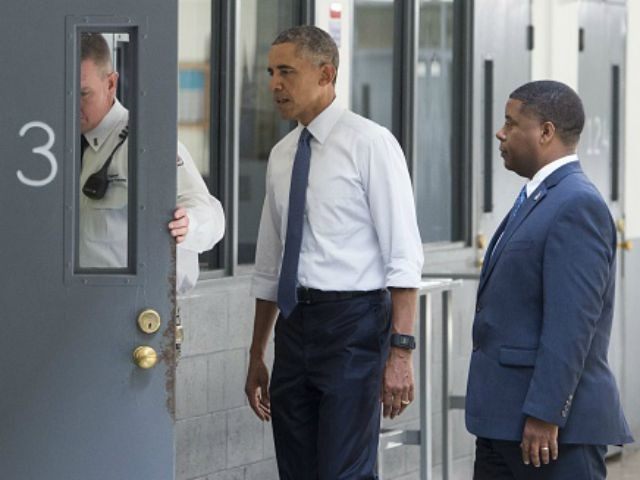President Barack Obama is cutting short the sentences of 214 convicted felons.
Obama is exercising his constitutional clemency power on a scale larger than any president has done in more than a century.
Article II, Section 2, Clause 1 of the Constitution includes that the president “shall have Power to grant Reprieves and Pardons for Offenses against the United States, except in Cases of Impeachment.”
While this clemency power does not extend to violations of state law (pardons for state crimes are within the purview of each state’s governor), presidential power can reach anyone involved in federal crimes, including those whose sentences are complete, those who have not yet been convicted, and those who have not yet even been charged.
With little fanfare, on Wednesday Obama commuted the sentences of 214 federal prisoners, setting them free. The White House boasted that this was the largest mass commutation since 1900.
That brings the total number of Obama’s grants of clemency to 562, which is more than the all the presidents since Dwight Eisenhower (nine presidents) combined.
Most of these criminals were convicted of federal drug offenses. Obama has called for changing federal law to decriminalize or lower the penalties for many of these offenses, and is using his clemency power to achieve the same end result for some by releasing prisoners convicted of violating those laws.
Obama’s top lawyer suggested the president might take these actions to the next level. White House Counsel Neil Eggleston released an official statement accompanying the president’s clemency grants, including:
The individual nature of the clemency process underscores both its incredible power to change a person’s life, but also its inherent shortcoming as a tool for broader sentencing reform. That is why action from Congress is so important. While we continue to work to act on as many clemency applications as possible, only legislation can bring about lasting change to the federal system. It is critical that both the House and the Senate continue to work on a bipartisan basis to get a criminal justice reform bill to the President’s desk.
There is no check or limit on a president’s power to grant pardons, commutations, or other forms of clemency, except for the Constitution’s specifying that pardons cannot be granted for convictions arising during the impeachment of a government officer. The Framers modeled this aspect of executive authority off the English kings’ power to grant a royal pardon—an absolute power left to the complete discretion of the head of state.
Obama has established a regular practice of attempting to rewrite the law without Congress. He rewrote Obamacare to give tax subsidies to millions of Americans who were not entitled to them, an administrative rewrite upheld in 2014 by a 6-3 divided Supreme Court in King v. Burwell. He also rewrote federal immigration law to grant amnesty to 4.5 million illegal aliens, a gambit that failed when the Supreme Court tied 4-4 this year in United States v. Texas.
There is a parallel between Obama’s approach to clemency and immigration. He claimed that his mass amnesty was an exercise of “prosecutorial discretion,” where law enforcement officials decide on a case-by-case basis whether to devote the resources to convict a particular individual. In reality, he was changing the law without Congress.
So too, as Eggleston said, clemency is exercised case by case. But Obama could have staff from the Justice Department’s Office of the Pardon Attorney (OPA) compile the files for thousands of convicts, and pardon them all at once without any individual scrutiny.
Given Obama’s practice of granting clemency for numbers of people far in excess of his modern predecessors, and his pattern of rewriting the law through executive actions, it is possible that after November’s election he could use his pardon power to release tens of thousands of criminals incarcerated under laws that Obama’s thinks should be changed, but does not have the votes in Congress to repeal. There would be no political or legal recourse to stop such an action.
Ken Klukowski is senior legal editor for Breitbart News. Follow him on Twitter @kenklukowski.

COMMENTS
Please let us know if you're having issues with commenting.